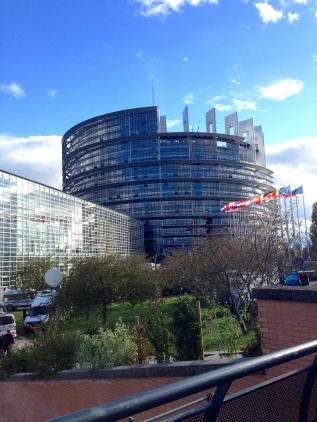
A Fordham student abroad attended lectures at the Council of the European Union about European identity. Courtesy of Catherine Oliver.
By Catherine Oliver
FREIBURG — A perk of studying abroad in Freiburg, Germany is the ability to travel and explore new cultures and food. Freiburg is located in the southwest corner of Germany, making it easier to travel to France or Switzerland than to navigate Grand Central during rush hour. This region, known as the Schengen area, has an agreement with 26 European countries to permit travel across their borders without a visa. The results of this agreement are a mix of cultures and a fluid yet complicated European identity.
My flatmate grew up in Germany, but worked in Switzerland and France. She identifies as German and cheers for SC Freiburg, the local soccer team, but the French and Swiss cultures that she was exposed to have had strong influences on her lifestyle. While she identifies as German, she does not want to discount the French and Swiss culture that have been a part of her life. For this reason she also identifies with a European identity. The debate between a European identity and national identity plays a major role not only for the people, but also in the politics of the European Union.
The European Union is unique from other governments because it is a federal system composed of sovereign national states. Typically, national interest and pride overpower the European identity. However, this is not the case for Germany. The national pride is surprisingly low. Yes, they cheer for Germany in the World Cup, but they do not always embrace their German identity in other ways. For example, at the beginning of the month, Germany celebrated the 25th anniversary of its reunification as a national holiday.
My friends and I were expecting parades and festivities, much like the Fourth of July, but, instead, there was little celebration. The biggest shock to us was the low number of German flags flying. As I ate my kaffee und kuchen, an afternoon coffee and cake tradition, with my flatmate, I asked her why this was. She replied that when people think of German pride they think of the Nazi regime, and Germans do not alighn themselves with that. I could not believe that this was the reasoning she gave, but it goes to show the lasting impression history can have on the present day.
Last week, I traveled to different European Union institutions and government buildings in Strasbourg, Luxembourg, Belgium and Paris, and discussed the role of national identity and European identity. I attended lectures at the Council of the European Union, the Commission and the Parliament and realized that these institutions are trying to balance the importance of national identity with a united Europe. Along with these citizens, these institutions are attempting to achieve a balance between both. During my free time in Brussels, I talked with the locals about whether they identify more with their national or their European identity. The answers were split. I honestly cannot blame them for that. With current political events, such as the refugee influx or the Euro crisis, some EU politicians are advocating for a united EU stance, while others are pursuing national agendas. I do not believe the citizens on the EU should ignore their national cultures or the surrounding European cultures, but I do believe in embracing both identities and creating a harmonious blend of them. For now, I am going to explore as much of the European culture as I can while not forgetting about my second home in Freiburg.
